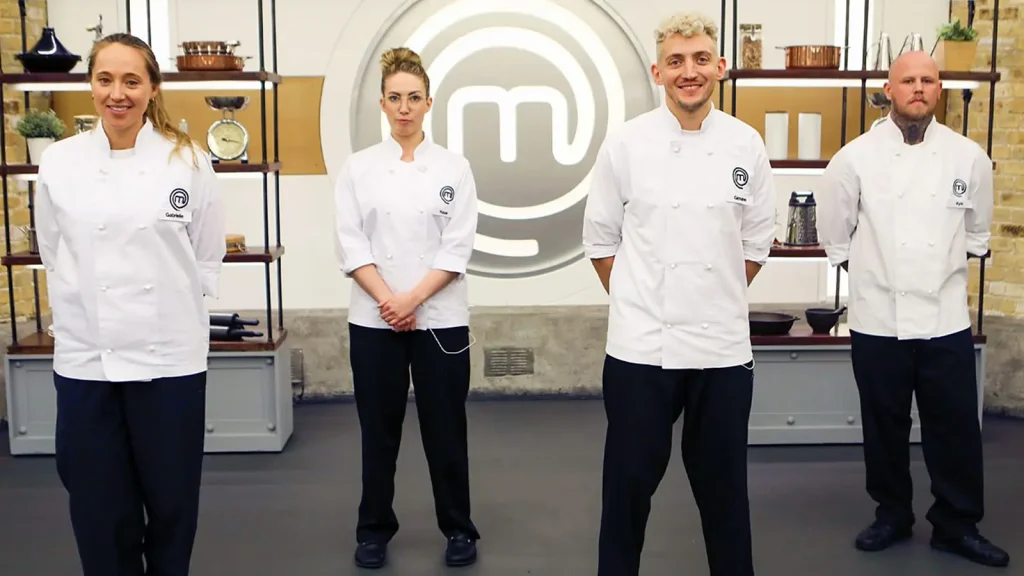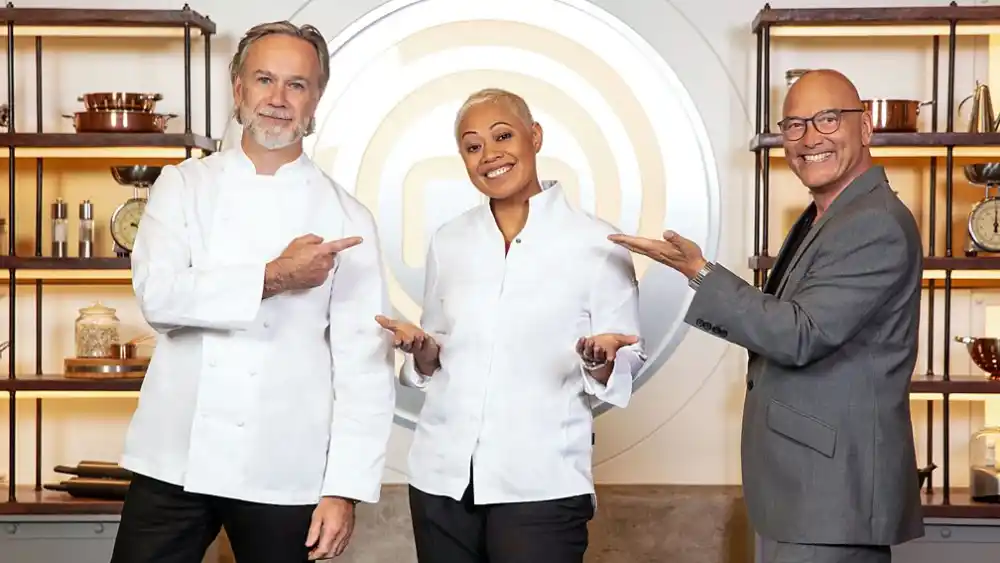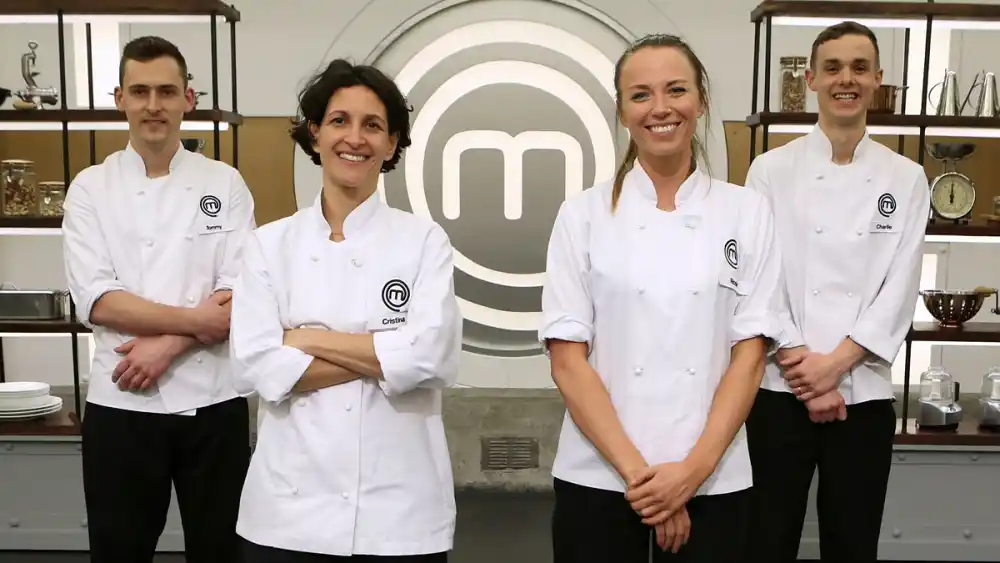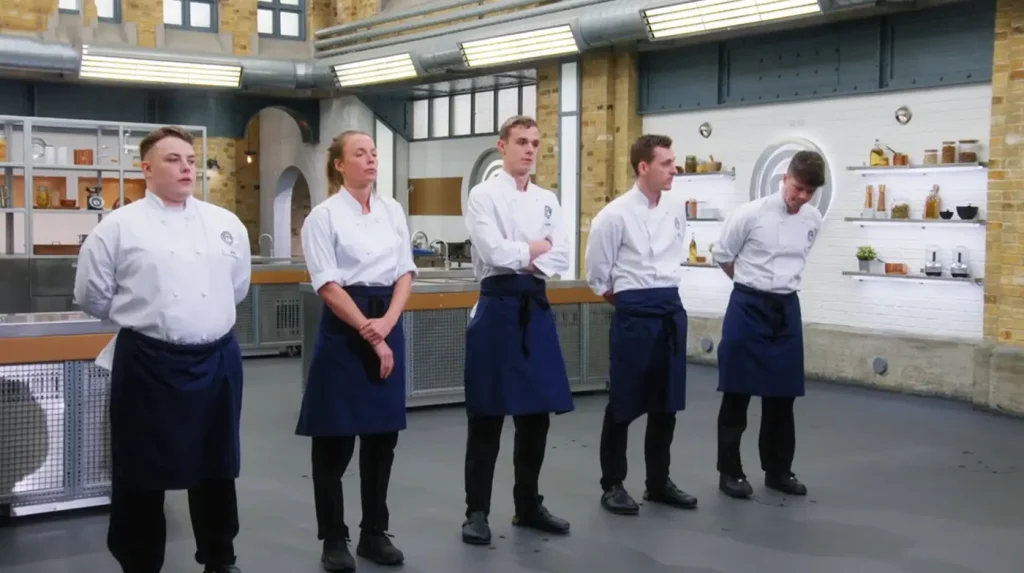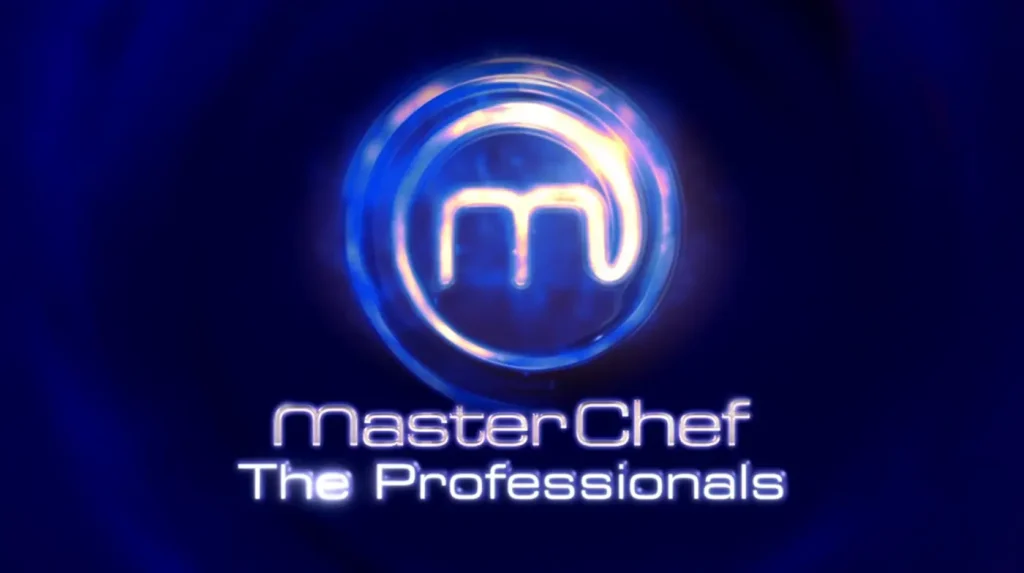MasterChef: The Professionals 2023 episode 8 – The quest for culinary dominance intensifies as judges Gregg, Monica, and Marcus welcome four new contenders into the esteemed MasterChef kitchen. Each chef arrives with a blend of hope and trepidation, ready to endure the rigorous challenges that lie ahead. The revered Skills Test looms over the first part of the competition, a gauntlet that must be run before the chefs are given the opportunity to parade their culinary identity in the Signature Menu round.
Marcus takes the lead in the day’s trials, presenting the first pair of chefs with a demanding task: they have mere minutes — twenty, to be exact — to prepare and cook a succulent lamb neck, accompanied by baba ganoush, dressed with a pomegranate vinaigrette, and served with toast. It’s not just about the lamb’s tenderness and flavor; the chefs must evoke the rich tapestry of Middle Eastern cuisine with flavors bold and vibrant enough to leave a lasting impression.
Following this, Monica sets a classic challenge that harkens back to the roots of French gastronomy: an apple tarte tatin, to be perfected and complemented with a smooth calvados crème anglaise. The challenge lies not only in achieving a caramelized perfection but also in mastering the intricacies of French pastry techniques. The judges’ palates are unforgiving; only a tarte with the ideal balance of sweetness and tartness, flakiness and creaminess, will suffice to appease them.
After surviving the white-knuckle ride of the Skills Test, the chefs then pivot to a test of their creativity and individual expression: the Signature Menu round. Here, each chef steps into the spotlight, revealing their unique culinary perspective through a two-course meal. This is their moment to lay it all on the line, to demonstrate a command of the culinary arts that could propel them to the top of the gastronomic hierarchy.
The crucible of competition will only yield two victors worthy of progression to the quarter-final — a stage where the intensity escalates and the true battle for the MasterChef: The Professionals trophy commences. As the pressure mounts and the stoves burn hotter, only those with exceptional talent, an unwavering drive, and a passion for culinary innovation will survive and advance, inching ever closer to the ultimate accolade.
MasterChef: The Professionals 2023 Episode 8 – A New Crop of Culinary Contenders Face the Heat
The hunt for the next MasterChef: The Professionals champion charges onward as four new talented chefs enter the iconic kitchen, ready to prove their skills and composure under pressure. Gregg Wallace, Monica Galetti, and Marcus Wareing stand poised to judge their creations with an uncompromising eye for perfection. This episode promises to separate the extraordinary from the excellent on the path to culinary greatness.
Grueling Gauntlet: Surviving the Infamous Skills Test
The Skills Test has struck fear into many aspiring MasterChef contestants. Within a lightning-fast 20 minutes, chefs must execute two dishes flawlessly, balancing complex flavors and impeccable technique. The first pair tackle Marcus Wareing’s Middle Eastern challenge: lamb neck with baba ganoush, pomegranate vinaigrette, and toasted bread. This requires mastery of meat cookery while layering the bold, smoky flavors of baba ganoush and tangy-sweet vinaigrette. Monica’s classic French pastry challenge for the second pair is equally daunting: apple tarte tatin with calvados crème anglaise. Their success hinges on executing delicate caramelization and pastry skills to reflect France’s rich culinary heritage. This rapid-fire round separates the quick-thinking chefs from those crumbling under the time constraints. Surviving the Skills Test is the first step in proving one has the composure, skill, and creativity to potentially earn the coveted MasterChef trophy.
Exploration of Flavor: Unpacking Baba Ganoush’s Depth
Baba ganoush is a quintessential component of Marcus’s Middle Eastern-inspired Skills Test dish. This smoky eggplant dip originates from the Levant region and has a complex blend of flavors. The eggplant is traditionally charred over an open flame, contributing a smoky essence. Then it’s pureed with tahini paste made from sesame seeds, olive oil, lemon juice, garlic, and aromatic spices. These elements create a rich, creamy dip with smoky undertones. When paired with tender lamb neck and bright pomegranate vinaigrette, the baba ganoush adds a complex earthiness, contrasting the bright acidity of the vinaigrette. Executing the balanced flavors of this dish under intense time constraints requires intuition and an innate understanding of Middle Eastern cuisine.
The Crucible of the MasterChef Kitchen
Stepping into the MasterChef kitchen is an unparalleled test of skill under pressure. Within these walls, perfection is the minimum standard, and a single mistake can destroy one’s chances at victory. The kitchen’s intense heat, dazzling spotlights, and looming portraits of past champions create an environment of constant stress. Each chef must cook flawlessly despite the judges’ penetrating stares, all while tuning out the ticking countdown. MasterChef’s kitchen uniquely simulates the adrenaline-fueled pressure of leading commercial kitchens. Those who thrive in this environment prove they can perform at the highest level professionally. Outside of actual restaurant experience, no training ground better prepares chefs for the realities of culinary excellence than the MasterChef crucible.
Crafting Perfection: The Nuances of Apple Tarte Tatin
Monica Galetti’s Skills Test centers upon the French classic dessert apple tarte tatin, served with luscious calvados crème anglaise. A perfectly executed tarte tatin requires precision at every stage. The chef must thinly slice apples and artfully arrange them in a skillet coated with butter and sugar. As the apples cook down, they must be carefully monitored to avoid burning. Then the chef covers them with delicate puff pastry and finishes cooking until the pastry is ideally golden brown. Timing and temperature control are essential for caramelizing the apples and pastry without going too far. The finished dessert should amalgamate the tartness of slightly firm apples with the sweet buttery crust and decadent crème anglaise. A sublime tarte Tatin is a pastry lover’s dream and a true emblem of French culinary mastery.
The Psychologist in the Kitchen: Monica Galetti’s Instincts
Among MasterChef’s revered judging panel, Monica Galetti brings a unique perceptiveness to critiquing each chef. Beyond her expertise as a seasoned restaurateur, she has an uncanny ability to mentally profile chefs based on their creations. Like a psychologist assessing a patient through their words, Monica uses food as a window into a chef’s psyche and emotional state. She’ll discern how comfortably a chef is operating under pressure, whether they hesitated or worked decisively, and if they had a clear vision or struggled with focus. According to Monica, she can taste when a chef is cooking anxiously versus with confidence. This skill makes her an invaluable judge, providing insights the other chefs may lack. When facing Monica’s scrutiny, chefs know they cannot hide behind a mask – she sees their true nature revealed through their food.
The Quarter-Finals in Sight: Surviving the Signature Menu
Having endured the gut-wrenching Skills Test, the four professionals can catch their breath before facing the next trial – the Signature Menu. This stage allows each chef to conceptualize their own two-course menu highlighting their unique culinary identity. All facets of the dishes must represent the chef’s distinctive style, creative vision, taste preferences, and strengths. The menus provide the judges insight into who the chefs are as artists and innovators. Only two will move on to the quarter-finals, coming tantalizingly close to the trophy. The Signature Menu is a chance for the professionals to take ownership of their creations. But also to carefully consider how each component will strike the judges’ senses – a task requiring intuition, restraint, and understanding their highly refined palates. These chefs’ identities as rising culinary stars will be defined by this challenge.
Balancing Act: Gregg Wallace’s Dual Perspectives
Among the MasterChef judges, Gregg Wallace brings a unique duality of perspectives, having experience as both a greengrocer and food critic. From his greengrocer days, Gregg retains an encyclopedic knowledge of ingredients, from the optimal ripeness of fruits and vegetables to the highest quality meats and fish. He focuses intensely on how each component is handled and prepared, refusing to tolerate anything short of perfect freshness and technique. However, Gregg is also highly mindful of the end result from a consumer standpoint. He offers critiques on portion size, texture contrasts, visual appeal, and whether the total dish delivers on flavor. Gregg can bounce between the producer mentality of examining ingredients and the food critic approach of assessing the consumer experience. For competitors, satisfying his bifurcated focus is doubly difficult.
The Genius of Simplicity: Allowing Quality Ingredients to Shine
Despite the complexity of many signatures dishes, the most successful chefs know when restraint is needed. The flavors of premium ingredients can be destroyed by overcomplicating a dish with too many contrasting elements or heavy-handed seasoning. A counterintuitive but wise approach is to deliberately underseason during the cooking process. This allows the natural flavors to pop when the food hits the tongue, rather than overwhelming them upfront. Quality meat, for example, may only need a modest sprinkling of salt before cooking and a grind of black pepper toward the end to accentuate its essence. Simplicity also applies to plating. Clean, minimalist presentation spotlights each component compared to busy, overstyled dishes. MasterChef chefs aiming for sophistication learn that elegance often lies in simplicity, stepping back and trusting sublime ingredients to be the star.
The Agony of Defeat: Learning from Culinary Failure
Inevitably, even exceptional chefs will make critical errors under MasterChef’s pressures. How they confront defeat can be as revealing as victory. Some become withdrawn or defeatist in the face of harsh critiques, while others seem unaffected, unable to take feedback constructively. But the most successful chefs treat every setback as fuel for growth. They absorb critiques graciously and probe for specifics on where precisely things went wrong. Through emotional regulation, they refrain from spiraling into negative mindsets. This resilience allows them to compartmentalize failure and maintain confidence in their abilities. While raw talent matters immensely, the capacity for personal growth may determine who ultimately builds a lasting career. MasterChef winners display both gifts—having equal parts skill and humility.
“Magic” Moments: Monica’s Concept of the Undefinable
Certain special MasterChef contestants embody an elusive quality Monica describes as “magic.” These chefs possess natural talent exceeding their experience levels, signaling untapped potential for brilliance. Their food conveys care and emotion without the chef saying a word. Monica believes magic chefs have an innate sensitivity to combinations of taste, texture, and visual harmony. Their intuition guides them to make unconventional decisions that nonetheless create perfect harmony. These moments of magic cannot be clinically explained, only sensed by those with refined palates. While not a concrete skill, magic is the X-factor that launches talented chefs into prodigy territory. Their dishes impact judges on an emotional and spiritual plane beyond technical execution. But the magic touch is sporadic and fleeting—the chefs must sustain it under pressure to ascend in the competition.
The Burden of Reputation: High Expectations for Returning Chefs
Occasionally, former MasterChef contestants deemed to have exceptional potential are invited back for another attempt. Having reached the finale stages in a previous season gives them valuable experience and heightened exposure. But with their reputation comes tremendous expectations to outshine most new contestants. The judges scrutinize their dishes based on remembered heights of excellence, now expecting the chef to exceed their past achievements. One flawed dish that only meets the average standard can dash a returning favorite’s chances. The positive momentum from their prior season also raises the chef’s own perfectionistic standards. With reputation comes added internal and external pressures that returning chefs must manage while cooking at a whole new level. Their advantage and burden is previous success—the challenge is building upon it under the weight of expectations.
The Motivational Speech: Marcus Wareing’s Tough Love
Beneath his often stern demeanor, Marcus Wareing cares deeply about nurturing each chef’s potential. When he senses doubt or lack of confidence hindering a contestant, Marcus will give an impassioned motivational speech. While undeniably blunt, his words aim to shock the chef into focusing and regaining competitive fire. He emphasizes that a defeatist attitude practically guarantees failure while passion and determination can overcome any obstacle. Marcus highlights that contestants should feel honored by the opportunity, not paralyzed by pressure. He understands that some chefs need tough love and frank reality checks to break negative thought patterns. Those who embrace his words rather than resist the hard truths can experience renewed motivation to conquer their self-limiting beliefs. Though his speeches push buttons, Marcus ultimatley wants each chef to become the best possible version of themselves.
Culinary Renaissance Persons: The Art and Science of Food
Success at the top tiers of the culinary world increasingly requires mastery of both the art and science behind food. The modern chef must have an equal blend of creativity and technical precision. This means complementing passion, imagination, and classical French techniques with a scientific understanding of how ingredients structurally transform. They utilize knowledge of chemical reactions during the cooking process and microbiology principles of fermentation. The best entrants on MasterChef: The Professionals fuse these competencies intuitively in dishes that balance emotion and technical excellence. They transition fluidly between the subjective artistry of flavor and plating with the objective mastery of ingredients and process. Those lacking in either dimension face significant disadvantages in rising through the ranks.
The Burden of Isolation: MasterChef’s Solo Journey
While the kitchen may form a chef’s foundational skill set, MasterChef introduces a new dimension of testing one’s abilities—isolation. Unlike leading kitchens where chefs collaborate as a team, MasterChef relies solely on the individual. No fellow chef is present to provide guidance, feedback, or delegation of duties during high-stress moments. Any lapse in judgment or momentary doubt cannot be outsourced—the chef must rely on their own faculties. For naturally collaborative individuals, this environment is uniquely destabilizing. However, it also simulates the solo pressure of entrepreneurship should contestants open their own restaurants. MasterChef thus prepares chefs for the realities of independence at the helm of a kitchen while filtering out those who over-rely on a team support structure.
The Summit Within Reach: Life After MasterChef Glory
For the blessed few who emerge triumphant on MasterChef, a world of possibilities await, at times beyond the culinary realm. While many winners do pursue roles in prestigious restaurants or open their own ventures, others become celebrities in their own right. Publishing cookbooks, hosting television shows, and obtaining product sponsorships are common avenues to extend public visibility. However, winners carry the MasterChef reputation as a badge of honor and evidence of their capabilities far beyond the kitchen. The competitive nature of the show forges mental toughness, perseverance, and grace under fire that translate across disciplines. MasterChef winners often evolve into multifaceted professionals with the world at their fingertips—the possibilities are endless for those who survive the grueling journey to the top.
Conclusion
MasterChef: The Professionals provides unmatched insight into the skills required for culinary excellence, as talented chefs either flourish or falter under the immense pressure. The challenges test all facets of their abilities – technical skills, intuition, creativity, speed, composure, and more. Withstanding the crucible of the MasterChef kitchen filters out all but the few destined for greatness. The competition accelerates chefs’ growth trajectories, forcing them to perform at levels exceeding their current capabilities. While demanding, MasterChef molds ordinary talent into extraordinary mastery. Winners emerge as paragons of the culinary world, ready to make their indelible impact. For those chasing the distant dream of such heights, MasterChef: The Professionals grants a rare glimpse into the physical and psychological frontier these chefs must conquer on the path to glory.
FAQ – MasterChef: The Professionals 2023 episode 8
What is the Skills Test in MasterChef: The Professionals?
The Skills Test is a high-intensity challenge requiring chefs to perfectly execute complex dishes within 20 intense minutes. It tests their technical abilities, intuition, composure under fire, and mastery of flavors.
How does MasterChef’s kitchen environment differ from real restaurant kitchens?
MasterChef removes the team collaboration element, isolating chefs and testing their solo capabilities. This is more reflective of the independence required when being an executive chef or culinary entrepreneur.
What qualities make Monica Galetti excel as a MasterChef judge?
Monica has an extremely refined palate combined with psychological instincts to discern chefs’ emotions, doubts, and confidence levels from tasting their food. This grants her unique insights.
How can simplicity actually enhance the impression of a MasterChef dish?
Allowing quality ingredients’ natural flavors to shine through modest seasoning and elegant plating prevents overcomplicating the flavors or presentation.
What is Marcus Wareing’s intention when giving tough motivational speeches?
Though blunt, his aim is to push chefs past self-limiting doubts by emphasizing their potential and the immense opportunity before them.
